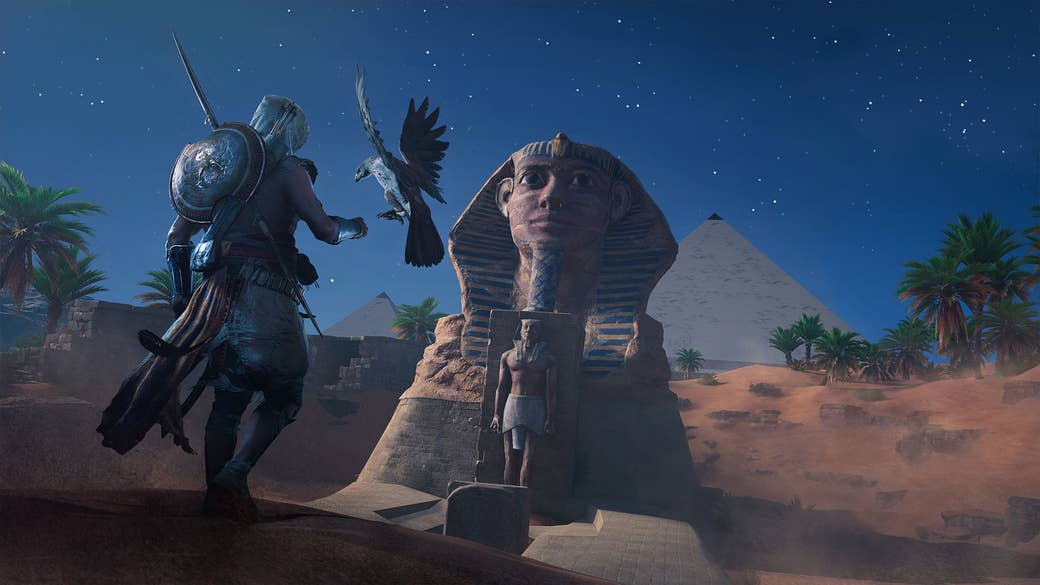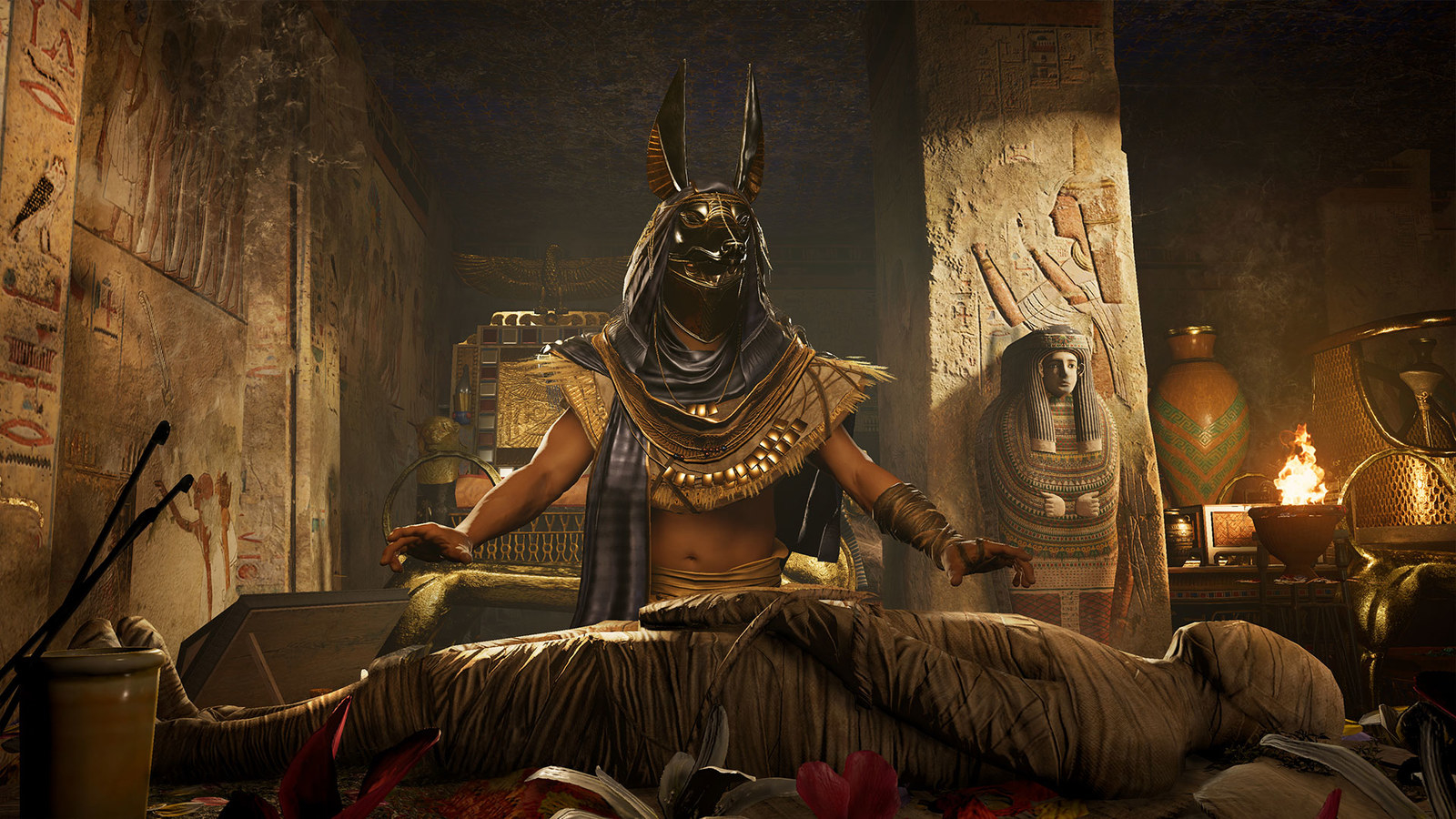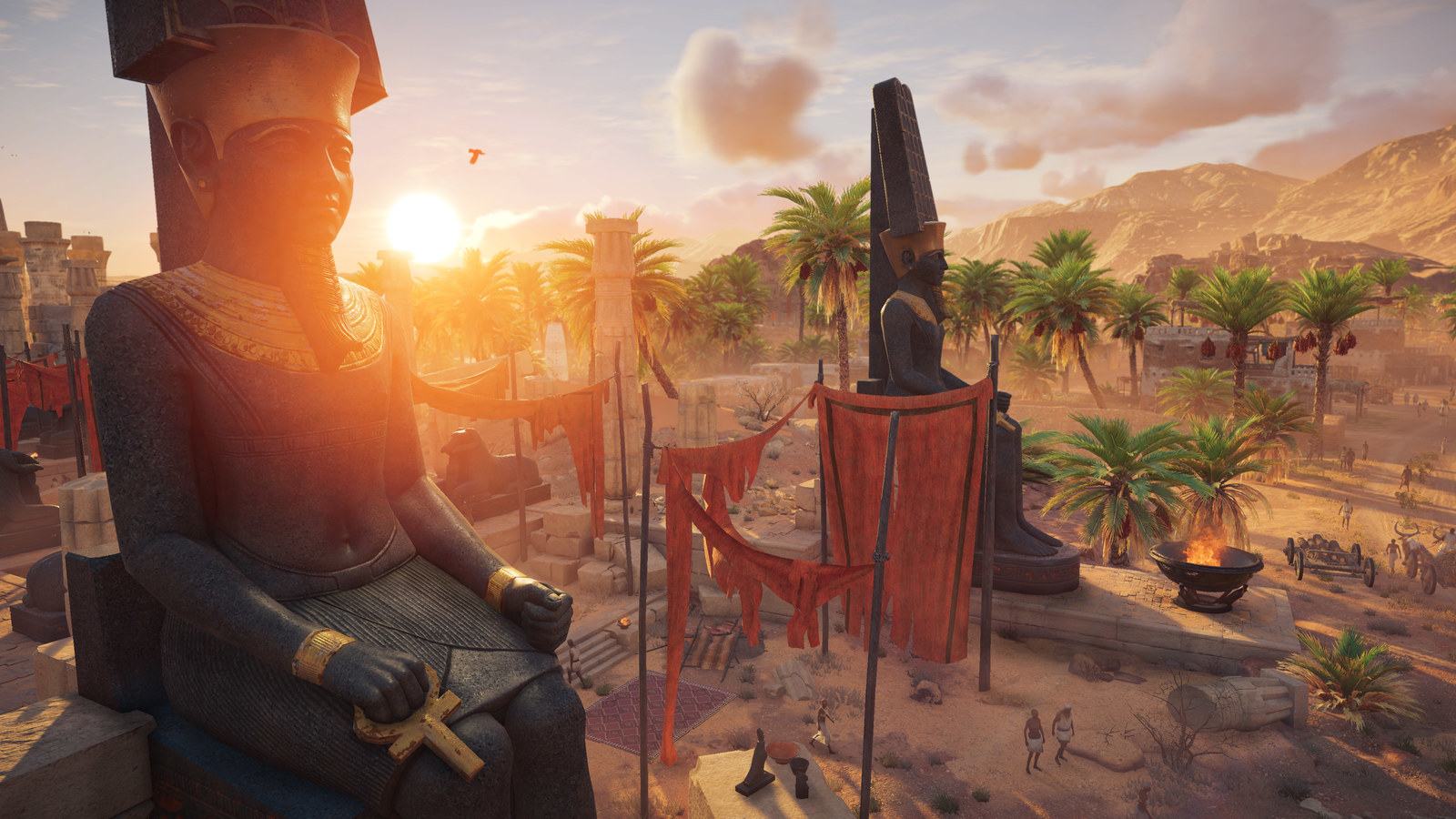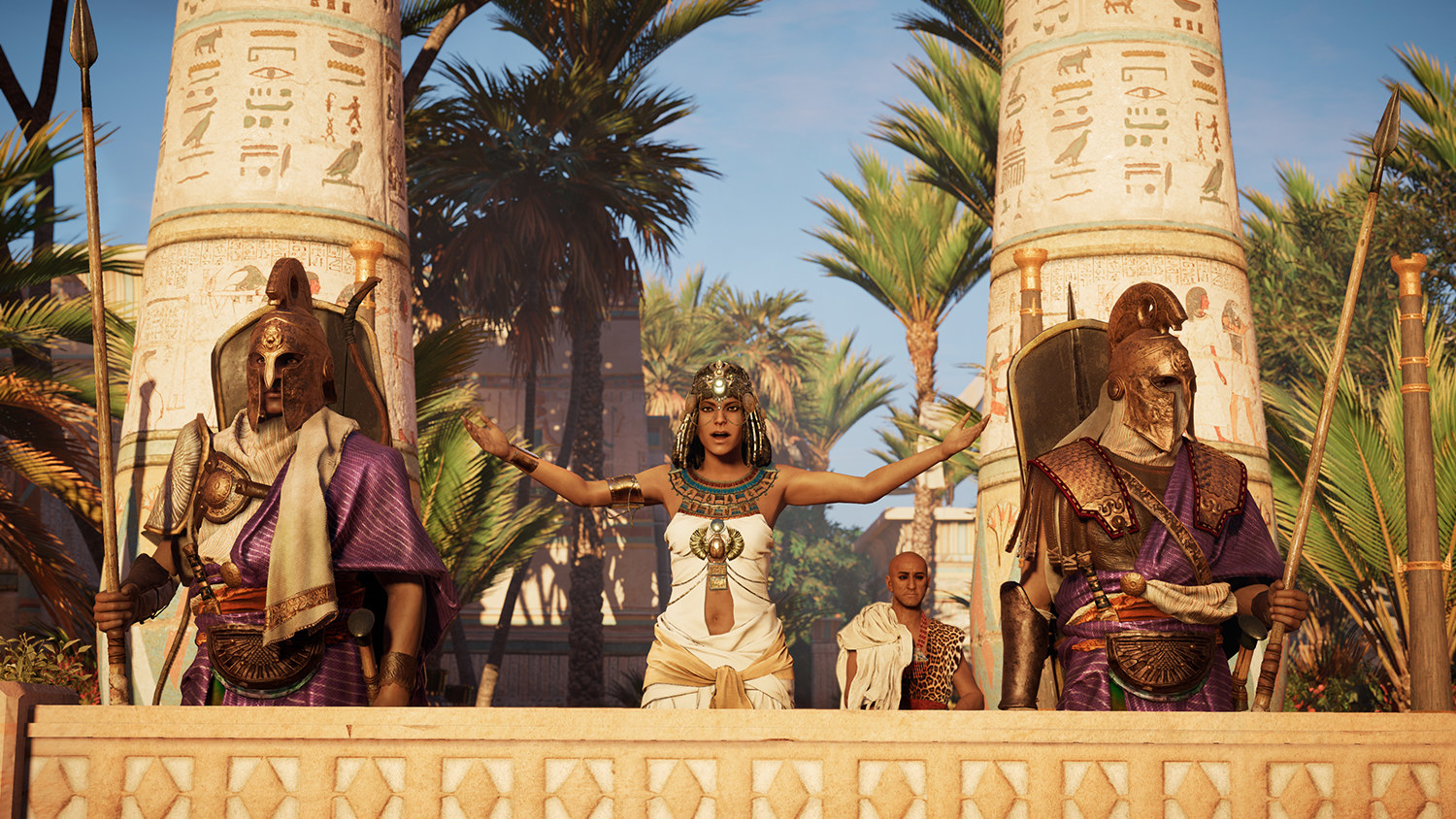Can a video game really teach you something? It sounds like an excuse a kid would give to carry on playing, when they should be doing homework or getting ready for bed.
But that’s what Assassin’s Creed: Origins proposes. The latest instalment in the franchise promises all the elements of the games you previously loved, like brilliant graphics and a rich, combat-led story steeped in a historically accurate setting. But Origins takes this further with a mode called Discovery Tour, that lets you skip all the violent stuff (if you want) and immerse yourself in the open world instead.
The game is set during Cleopatra’s rule as queen of Egypt, which began in 51 BC, a time of huge geopolitical change and conflict. Rich in art, culture, and development, Ancient Egypt is a vibrant arena to play in. With the game’s Discovery Tour feature, you can explore the game’s recreation of the civilization of Ancient Egypt with no barriers and go on guided tours that tell you about life back then, from the history of grand pyramids to the mummification process. Within the main game itself, the narrative, scenery, language, and entire environment is built off the backs of years of research by historians and Egyptologists. Origins, Ubisoft posits, is one of the most fleshed-out, faithful, and detailed recreations of Cleopatra’s Egypt to exist. Ubisoft claim that with this game, they have finally been able to make “history everyone’s playground”.

Learning history requires an acceptance that there never is just “one truth” or “narrative” as to what happened.
I studied history at university, so when I heard about this claim, I was immediately curious...and, admittedly, incredibly skeptical. I was taught that the best way to learn history is to pour over firsthand and secondhand sources, gathering a bunch of opinions from a variety of historians to craft your own narrative and argument of a historical event or period. Maybe you can learn some rudimentary facts from a video game, but anything more than that sounds pretty ambitious.
Learning history at university, and even at HSC, requires an acceptance that there never is just “one truth” or “narrative” as to what happened. Furthermore, what happened isn’t even as important as why. Because it’s with that "why" that you can truly understand the attitudes, behaviours, personalities, and way of life of a society. It’s with the "why" that you engage with their humanity. History to me isn’t cold, hard facts and dates. History is storytelling and requires an understanding of the complexities of human relationships, interactions, and egos.
Maxime Durand, a historical researcher for Ubisoft, explained to me how they took this complex and nonlinear process of historical research into account when making the game. Durand’s role on the Assassin's Creed team is to ensure the accuracy of gameplay and its story. “I work the same way any other historian would work,” explained Durand. “We start very broad with high-level sources like encyclopaedias and books. And from there I figure out where to dive deeper, and discover sources they’ve referenced and look at those, and so on.” Once they dig into a variety of sources, Durand explained how they take into account many different views when settling on a historical narrative. “With the Sphinx (the Great Sphinx of Giza), we studied Mark Lehner’s theories to inform a lot of our recreation. Mark leads the AERA (Ancient Egypt Research Associates) and he did photogrammetry of the statue, so his history is the most accepted version.” But the team embraced a few, slightly crazier theories, too.
So the backbone of all content and artwork in the game is based on research and working with experts in the field. The team recruited a variety of historians and Egyptologists to work on the game and spent years grabbing as much information as possible. Once they figured out a broad picture of the society and political tensions of the time, they tackled the tiny details. In a truly open world, it needs to be filled with people with their own backstories, relationships, and professions. Durand explained to me how Egyptologists even guided the game developers in the gestures that background characters like fishermen and merchants should make, as well as the language and voices they use.

It’s this blend of historical accuracy with artistic license that keeps the game spirited and dynamic.
This attention to detail applies to the bigger elements of the game, too. For example, Durand explained to me the level of thought that went into developing the Sphinx: “We didn’t want to portray the Sphinx as it exists today, nor did we want to portray it as when it was first built. We specifically wanted to show how it was during the reign of Cleopatra. So we had to carry out research to understand the colours it would have been, its relative size, and the state of decay it would have had at that point in time. It’s all these small bits of work we do that make the environment believable and immersive.”
Going so far back in time also means there are a lot more uncertainties, because there are far fewer sources to pull from and huge language barriers. Franchise art director Raphael Lacoste explained how the team used this uncertainty to their advantage. It allowed the art team to create elements that are rooted in credible history, but amplified by imagination. It’s this blend of historical accuracy with artistic license that keeps the game spirited and dynamic, while still evoking a feeling of authenticity in the player.
And this is something the franchise is keen to stress: The game does not claim to be 100% accurate, nor could it ever really be. The team’s main aim was to create something that feels authentic and complete. As Durand explained: “We have to get the pieces that we know right, and the rest? Well, we have to make it believable.”
It’s this essence of authenticity that offers real historical value to the players. While playing the game, you’ll pick up on facts about society as it existed back then, from the hierarchies on the ground to the battles on its political stage. But where Origins really shines is with its potential to help players understand beyond that: to understand how these facts interweave with each other, to understand what these facts mean. These elements come together to create a vivid picture of a long-lost culture, unlocking a viewpoint of Ancient Egyptian civilisation that transcends far beyond the snippets and stereotypes within the mainstream.

The Discovery Tour isn’t meant to replace learning history through other means – rather, it amplifies it.
And if the game inspires you to learn more about the history its set within, Origins provides a great starting point for that, too. Previous games in the Assassin’s Creed franchise had an encyclopaedia feature that never really felt like the best use of all the research they amassed. However, with Discovery Tour, Assassin’s Creed has figured out how to make the most of their highly detailed recreations. In Discovery Tour mode, the player can explore the entire recreation of Ancient Egypt without any conflict or storyline and simply just soak it all in. Supplemented by guided tours from Egyptologists who deliver real historical knowledge, in this mode, you can wander the streets, climb dunes, and take in a faithful recreation that artists and historians have spent years developing. It is, as Ubisoft describes, a “living museum”.
As a historian, this totally excites me. The ability to learn the foundation to a whole period of history through a new medium opens up history to a lot more people and does so in a way that’s pretty engaging. The Discovery Tour isn’t meant to replace learning history through other means – rather, it amplifies it. You can visualise Alexandria in 49 BC through the game, then turn to a book to delve even deeper into the ancient city’s cultural fabric. You can “watch” a body being prepared for mummification, then use than knowledge to win a pub quiz.
Jean Guesdon, creative director for Assassin's Creed: Origins, isn’t sure what the Discovery Tour mode means for the future of gaming, but he has high hopes. As he explained to me, for years parents, teachers, and professors have written in, asking if the game could do more with the masses of knowledge they pull together. With Origins, Ubisoft has answered. “We think that the guided tours are for everyone – children and grandmothers, gamers and non-gamers. Because there is no combat, there is no barrier and no need to know how to play game. You can just learn the history.”
The game has painstakingly rebuilt Ancient Egypt, and all that research and effort doesn’t feel like vanity. Games, unlike books or films, are constrained by less boundaries, and can give players a truly immersive experience that feels true to life.
For example, Lacoste explained how the game’s artists used lighting to evoke depth and mimic reality. Taking full advantage of the HDR of the newest consoles, Origins glimmers in daylight and is swallowed by deep shadows in the evening. This means you can be in the same place from dawn until dusk, and it’ll look completely different – just like a real city would. This level of detail in the artwork is key in making an immersive, open world truly work. “The artwork in a game, when done right, can make you feel something,” Lacoste says. “For example, all of a sudden you can face a sandstorm in the game, completely at random. You can see that your character is really struggling, putting his hand over his face as he climbs a dune. You then lose your compass so you are literally lost, and the player will feel that, too.”

What struck me about the game was how it's done away with loading screens and out of bounds places – you can walk, run, swim, or gallop from one end of the country to the other without needing to wait for anything to load. It’s only now that a game exists without these boundaries that I realise how much they can pull you out of the story. While playing, I drifted between following the main story and just wandering around the cities to explore. Along the way, I ran into a lot of people who I could choose to help if I wanted to, which made it feel like I was truly in control. The game is living and breathing and pushes forward with its own stories, whether you engage or not. What that results in is a convincing and immersive representation of history that offers real value. Whether you use the Discovery Tour or play the game and follow its narrative, you’ll absorb an understanding of Ancient Egypt that extends to, and goes beyond, just facts. You’ll get a sense of what it was like, and that’s something very few mediums can offer.
The development of the Assassin’s Creed franchise with Origins represents a real maturity in video games. It’s an example of an industry recognising that it can offer something that’s both entertaining and impactful. Origins is also an example of technology finally catching up to the maker’s vision. “Making history everyone’s playground” comes to life a lot better in a 4K limitless, load-screen-free environment – and the thought of where the team could take this next, with the big industry push towards VR, is dizzying and exciting.

